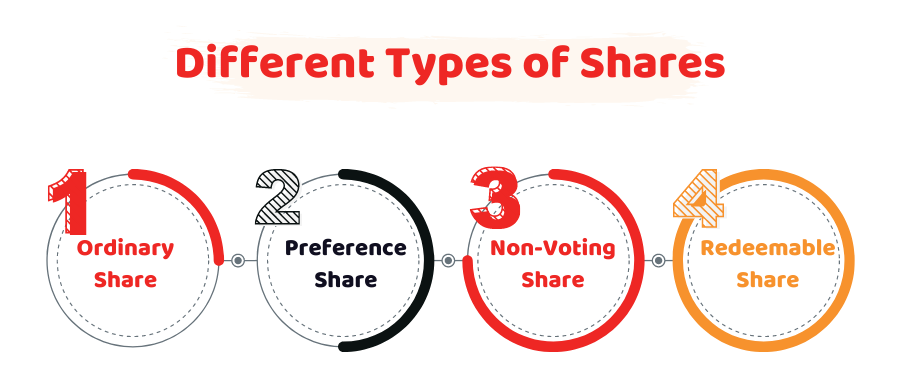If you are incorporating a company for the first time, you may be unaware of the issues that come along with it. To establish one, you need funding for which you will most probably raise equity finance via investors. But selling shares is not that simple enough. You need to understand different types and classes of shares before their issuance as they have significant long-term implications. In addition, you also need to know what they mean for shareholder rights, conditions, entitlements. So to avoid the pitfalls and unfavourable circumstances, read on to find out the different shares type, what is ordinary share, its classes, what are the benefits and downsides of an ordinary share.
Want to set up your Limited Company in the UK? Why not speak to one of our Limited Company Accountants? Give us a call on 02034411258 or request a callback.
Different Types of Shares
Shareholders invest a different amount of money on buying shares from a limited company. These shares are given to them based on different rights, conditions and ownership claims. The main types of shares that a limited company issues are:
- Ordinary Share
- Preference Share
- Non-Voting Share
- Redeemable Share
In this blog, we’ll discuss what is an ordinary share and the other share types.
What is Ordinary Share?
These are the common types of shares where the shareholder gets one vote for a single share and these allow the owner to equally participate in the company’s dividends. They have many advantages.
Here the shareholders not only get voting right in the company’s meeting, but they receive a proportional income (as dividends) depending on the company’s performance. These shares do not have any maturity date. It means that the share ownership is not affected until the company is taken over or de-listed.
Non Voting Shares
These shares don’t carry the voting right and the shareholder doesn’t get any right to attend the meeting. These are generally given to the employee so that the income can be given as dividends to them for tax saving purposes.
Preference Share
These shares allow the shareholder to claim a fixed amount as a dividend every year. It also works as a percentage of the nominal value (as stated when shares were issued). Here, the dividends are paid prior to the ordinary shares.
Redeemable Share
Redeemable shares are issued on the condition that the company will be liable to buy them back when required in future. These can be fixed or as per the will of the directors. Non-voting shares are normally redeemable shares so that when an employee leaves, the shares can be bought again at a nominal price.
Classes of Ordinary Shares
As per the constant of a shareholder, a company can further classify ordinary shares into different categories that are called alphabet shares. This impact on various factors of the shareholder like:
- Entitlement to Vote
- Entitlement to dividends
- Entitlement to the capital on winding up/disposal
Looking for a Limited Company Accountant? Click here to get to know about the inclusive monthly package!
What if a Company Collapse?
Holders of ordinary shares get their due portion, if the company is wound up, but only after the issuance of preferred shares and bonds. So, ordinary shareholders face the same situation as an unsecured creditor when a company collapse.
Advantages of Ordinary Shares
- Control: Ordinary shareholders get the control to make a vote on the important matters taken by the directors of the company.
- Dividends: If the company performance is well, the dividend of the ordinary share may increase.
- Other Rewards: Along with large dividends, they are chances to get rewards when a company performs well.
Disadvantages of Ordinary Shares
- Risk: There is a risk that if a company doesn’t perform well, you can’t expect large dividends from it. When wound up, ordinary shareholders remain at the back of the queue for getting the money back. If all the money is distributed to other shares, the ordinary shareholders will get nothing.
Quick Sum Up
To conclude the discussion of what is ordinary shares, we hope that now you have got a basic understanding of the types of shares and the pros and cons of ordinary shares. Keep in mind that ordinary shares can be great for getting vote rights and dividends with no maturity dates. However there are its downsides too when it comes to a company’s bad performance or when it is struck off, the dividends might be received late or they might not be received at all. As other shares are given the first preference over ordinary shares when a company gets dissolved.
At Accotax we take the burden off your shoulders and work for the robust growth of your business. Whether you’re concerned about the company formation, accounts, taxes, tax return, payroll or financial advice, we cover it all!
Reach out to our certified accountants in London to overcome your financial worries!
Get an instant quote for a customized offer!
Disclaimer: This blog provides general information on ordinary shares.






















































